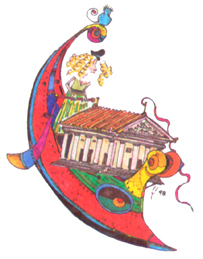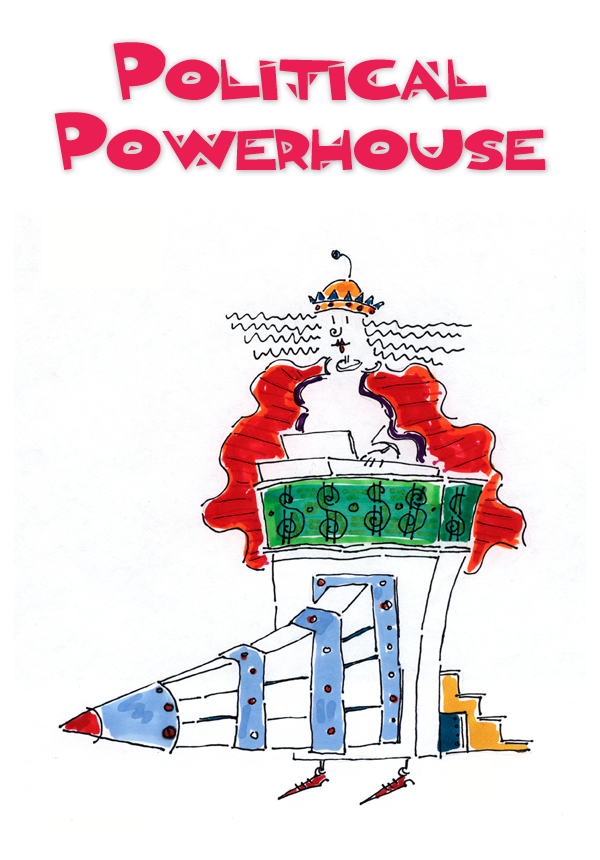From “civilization” to “people” to “democracy,” the English language has adopted many terms that are important in defining ourselves and our political systems.
Alcatraz
When the Muslims ruled southern Spain, many Arabic words entered the Spanish vocabulary. From the Arabic noun al-qadus, meaning “water carrier,” the Spanish formed two words: arcaduz, meaning “a bucket” or “a channel for water,” and alcatraz, meaning “a pelican.” According to the thinking at the time, the Spanish believed that pelicans used their bucket-like bills to bring water to their young, hence the coining of the term “alcatraz.” Years later, the Spanish named the island in San Francisco Bay Alcatraz because it was home to a large pelican colony.

Alcatraz Island first housed a military prison in 1868. From 1934 to 1963 it served as a prison for dangerous civilian prisoners. Some of its famous residents were Al Capone, George “Machine Gun” Kelly, and Robert Stroud, the “Birdman of Alcatraz.”
Alibi
This commonly used English noun is actually a Latin adverb. More than 2,000 years ago, the Romans combined alius, meaning “other,” and ibi, meaning “at another place” or “elsewhere.” English uses this term primarily in a legal context to refer to a witness’s proof that he or she was not at the scene of a crime.
Amnesty
Tradition says that a Greek general was the first to grant an enemy amnesty. That is to say, he officially pardoned those whom he had opposed in battle and chose not to remember the acts they had committed against his country and people. In Greek, the word for this action is amnestia, which means “a forgetting.” Amnestia is itself a derivative of the Greek prefix a, meaning “not,” and the Greek verb mnasthai, meaning “to remember.”
Anarchy
This term refers to a political situation in which there is no legitimate or commonly recognized leadership. Such a situation can involve violence and lawlessness. Fittingly, “anarchy” traces it roots to the Greek words an, meaning “without,” and arches, meaning “a leader.” An anarchist is someone who rebels against authority or an established order.

The father of the philosophy known as Stoicism, Zeno of Citium, is also known as the father of anarchism. Stoics—followers of Stoicism—believe that one achieves virtue only by living in harmony with nature.
Aristocracy
Two Greek words—aristos, meaning “best,” and kratos, meaning “rule,” “power,” or “strength”—combine to form “aristocracy,” which refers to a government of the noble class or wealthiest people. An aristocrat is a member of the privileged upper class and a person whose social position and wealth is usually inherited.

Assassin
In 11th-century Persia, a man referred to as the Old Man of the Mountains founded a small secret society whose members were feared throughout the Persian Empire. The main purpose of the group was to terrorize and kill leaders of the Crusades as they traveled to the Holy Land. Followers of the old man committed their crimes under the influence of the drug hashish. As a result, they became known as hashshashin, the Arabic term for “hashish eaters.” English borrowed the name and changed it to “assassin.” Today, the term is used to refer to anyone who murders a high-ranking or notable person.

The first U.S. president subject to an assassination attempt was Andrew Jackson. The first president to be assassinated was Abraham Lincoln in 1865.
Bobby
In England, the common name for a police officer is “bobby.” The word traces its origin to sometime between 1828 and 1830, when British Home Secretary Sir Robert Peel reorganized the London police force. Since Peel’s nickname was “Bobby,” many English people began using Peel’s nickname for their police officers.
Candidate
In ancient Rome, a citizen who was campaigning for public office would make sure his toga was as white as possible. The Romans began using their word candidatus, which means “clothed in white,” to refer to candidates for public office. Candidatus is itself a derivative of another Latin word—the adjective candidus, which means “white.”

City
This term traces its history to the Latin noun civitas, meaning “citizenship” or “community.” Actually, civitas is a derivative of the Latin noun civis, meaning “citizen.”

The first American city to have gas streetlights was Baltimore, Maryland. They were installed in 1817.
Civilization
Civilization refers to the process of coming from a primitive or savage condition into a social organization that is marked by the development and use of a written language and by advances in the arts, sciences, and government practices. The Latin root of this noun is simple and to the point—civis (“a citizen”). Civis was a key word in the ancient Roman vocabulary. A civis was a person who held the prized rights of Roman citizenship, as opposed to a foreigner (an outsider with no privileges) or an enemy. Other words that are derived from civis are citizen (“a person owing loyalty to and entitled to protection from a state or nation”), civics (“the branch of political science that deals with the rights and duties of citizens”), and civil (“relating to or characteristic of a citizen”).
Curfew
During the Middle Ages, the law dictated that fires used as lights along the streets had to be extinguished when the evening bell tolled. After the French conquered England in 1066, the French phrase couvre feu (“cover the fire”) was commonly heard in England. The English adopted the phrase and changed it to “curfew.”
Democracy
“Democracy” is composed of two Greek words: demos, meaning “people,” and kratos, meaning “rule” or “strength.” It translates to “a government by the people.” A democrat is someone who believes in or supports this type of government.
Dynasty
This word refers to a succession of rulers, all of whom are members of the same family. History has many examples of dynasties around the world, such as those in China, Egypt, England, and India. “Dynasty” traces it roots to the ancient Greek noun dynamis, meaning “power” or “force,” and from the Greek verb dynasthai, meaning “to be strong.”

The first documented dynasty in China was the Shang (about 1766 to about 1122 b.c.). The last dynasty in China was the Qing, which ended in 1911.
Election
By definition, “election” means “a choosing” or “a choice” and usually refers to the selection of a person for a particular political office by means of voting. The term is actually a combination of two Latin words, the preposition e (“out of”) and the past participle lectus (“chosen” or “picked out”).

Embargo
When a country wishes to express its disapproval of another country’s actions, it often imposes an embargo on that country. Originally, this decree prohibited all commercial ships belonging to the country against which the embargo is in effect from leaving or entering the ports of the country imposing the embargo. Today it can refer to any prohibition of trade. The word is a derivative of the Latin prefix in (“in” or “on”) and the Medieval Latin word barra (“barrier”).
Empire
“Empire” is one of several English words that traces it roots to the Latin verb imperare, meaning “to command.” Others are emperor, imperial, and imperious. Imperare is actually a derivative of two Latin words, the preposition in, meaning “in,” and the verb parare, meaning “to set in order.” An emperor is a male ruler of an empire. Imperial is suggestive of an empire or having supreme authority. Someone who is imperious is arrogantly domineering or overbearing.

The British Empire was one of the largest the world has ever known. The seeds of its establishment date to the 1500s and the great era of exploration. By 1914, the British Empire included almost 25 percent of the earth’s land surface and population.
Escape
In times past, men and women often wore traveling capes or cloaks. If a person was chased by someone and caught by the cloak, he or she could break free by quickly unfastening the cloak. To show this action, “escape” was formed by joining two Latin terms—the preposition ex, meaning “out of,” and the noun cappa, meaning “cape.”
Fascism
The Etruscans used a bundle of hollow rods bound together with red thongs to symbolize the authority of their leaders. They inserted an ax into the bundle to indicate absolute authority. The Romans continued the tradition but removed the ax within the city limits. Fasces is the plural of their term fascis (“bundle”). In the early 1900s, members of an Italian organization later headed by Benito Mussolini called themselves Fascists. As a symbol, they used the Roman fasces because they felt it represented their philosophy, which called for strict enforcement of law and order and intense national pride. The movement spread, and the term “fascism” came into being.

The Fascist movement (1922–1943) headed by the Italian dictator Benito Mussolini formed in response to a lack of leadership and difficult economic times following World War I. Members of the Fascist party wore black shirts, organized themselves into military groups, and used a straight, outstretched arm as their traditional greeting.
Govern
The comparison between a leader ruling a country and a captain skippering a boat is an old one. Ancient Greek texts often use the phrase “ship of state” to mean a country or city-state. When the Greeks sought a word to describe a ruler’s ability to guide the country, they used their verb kybernan, meaning “to steer a boat.” The Romans adopted the term, Latinizing it to gubernare. English further adapted the term to “govern.” The meaning, however, has remained much the same.

Grand vizier
The Ottoman Empire was a hereditary Islamic state that controlled southeast Europe, the Middle East, and North Africa from the 14th to 20th centuries. The highest-ranking public official of the empire was the grand vizier. He was entrusted with much decision making. “Vizier” traces its roots to the Arabic term wazier, “the bearer of burdens.”
Guillotine
A monster in the shape of a machine is what many people considered the guillotine. This 18th-century invention was used by French independence fighters to behead their captured enemies. The gruesome machine chopped off a person’s head with a large blade. It was named after Joseph I. Guillotin, a doctor who suggested that such a device be used.

“Guillotine” also refers to a parliamentary device whereby a government imposes a time limit on discussions of legislation.
Iron Curtain
On March 5, 1946, Winston Churchill, who had been Great Britain’s prime minister during World War II, was in the United States to receive an honorary degree from Westminster College in Fulton, Missouri. In a speech, Churchill voiced his misgivings about the growing Russian influence over Eastern Europe when he said, “From Stettin in the Baltic to Trieste in the Adriatic, an iron curtain has descended across the continent.” Almost immediately, Churchill’s “iron curtain” phrase was adopted by other statesmen and nations to refer to Russia’s insistence on isolating itself and its territories from the world.

“I have nothing to offer but blood, toil, tears, and sweat,” declared Winston Churchill on becoming prime minister of England. He held the post from 1940 to 1945 and from 1951 to 1955.
Jury
The English noun “jury” is derived from the Latin verb jurare, meaning “to swear an oath.” Today, members of a jury in a court swear an oath to uphold the law.
Libel
The Latin noun for book, liber, originally meant “bark.” In very ancient times, the bark of certain trees was used as writing material and to make books, so liber soon acquired a second meaning. In later centuries, attacks against laws, individuals, and ideas were often made by writing the accusation on several sheets of paper. The authors then distributed these “little books.” To name this type of defamatory accusation, English adopted the Latin term for “little book,” libellus, and changed it to “libel.”
Maharajah
A maharajah is a prince who ruled one of India’s chief regions. Its origin is the Hindi adjective maha, meaning “great,” and the Sanskrit noun raja, meaning “king.”
Metropolis
This word is formed by combining the Greek noun polis, which means “city,” with the Greek prefix metro, meaning “mother.” Thus “metropolis” means “a mother or parent city, a chief city.” See also acropolis and necropolis.
Mob
The word “mob” is actually an abbreviation. Before 1700, when an English-speaking person wished to refer to the populace or to a disorderly group of people, he used the Latin phrase mobile vulgus. Mobile, which means “changeable” or “fickle,” modified the noun vulgus, meaning “the populace” or “a crowd.” Early in the 18th century, this phrase seemed too lengthy to some and it was shortened to “mob.”
Monarchy
Referring to a government ruled by a king or queen, “monarchy” is formed from the Greek words mono, meaning “alone” and arches, meaning “a leader.” A monarch is the sole ruler of a state or country.
Necropolis
By combining the Greek noun polis, which means “city,” with nekros, meaning “a dead body,” English has “necropolis,” which describes a cemetery. See also acropolis and metropolis.
Ninja
This is a Japanese word meaning “hired assassin.” In Japanese, nin means “to endure” and ja means “person.” The samurai (formerly, members of Japan’s military class) often employed the ninja, who dressed completely in black for nighttime work and in khaki for daytime assignments. Since the ninja belonged to a secret society, there are few written records concerning their organization.
Oligarchy
From a combination of the Greek words oligos, meaning “a few,” and arches, meaning “a leader,” we get “oligarchy,” which refers to a government ruled by a few individuals. An oligarch is a member of a small government faction.
Ostracize
In ancient Athens, if the people wished to banish a particular person from the city, a special meeting of the Assembly (adult male citizens) was called. If 6,000 votes were cast against any person, the person was required to leave Athens for 10 years. Voters wrote the name of the person they wanted banished on pieces of clay called ostraca. Today, the English verb “ostracize” means “to banish or exclude an individual.”
Patriot
The Latin word for father is pater. To refer to their capital city, the ancient Romans used Roma, but when they wished to refer to Rome as their homeland, their native country, they needed another term. Because they looked to the early founders of Rome as the fathers of Rome and Italy, it was only natural to use pater as a base. The result was patria, meaning “fatherland” or “homeland.” English then borrowed patria and formed “patriot” to refer to a person who loyally defends and supports his or her country.

During the Civil War, colorful lithographic designs on envelopes bombarded the public with images of American flags, notable people, and historic events. The intent was to rally support and inspire patriotism.
Patron/Patronage
The words “patron” and “patronage” both trace their origins to the Latin noun pater, meaning “father.” A patron shares many characteristics with a father: Both act as benefactors, protectors, supporters, and defenders. Patronage is the support or influence of such a person.
Plutocracy
A plutocracy is a government ruled by the wealthy. The term traces its roots to the Greek nouns plutos, meaning “wealth,” and kratos, meaning “rule” or “strength.” Plutos, in turn, traces its origins to Pluto, the god in ancient Greek and Roman mythology who ruled the underworld. Pluto became associated with wealth because of the rich mineral wealth found below the earth.
Political
The ancient Greeks used their word polis, meaning “city,” to form the noun polites, meaning “citizen.” Centuries later, English borrowed the word polites to form the adjective “political.” It describes people and events involved in government.
Poll
Centuries ago, pol (also spelled polle) meant “head” or, more exactly, “the top of the head.” Officials would travel from village to village to take a count of heads (pols) of people who favored or opposed a law or a candidate for office. Gradually, “poll” came to refer to votes both in an election and in an opinion survey.

A poll tax is usually a set fee placed on a person before he or she is allowed to vote. The imposition of this kind of tax has sparked several rebellions, including the Peasants’ Revolt in England in 1381. Peasants had little money, and the poll tax kept them from voting. In recent times, it contributed to voter dissatisfaction with Margaret Thatcher, England’s prime minister in the 1980s.
Protocol
Centuries ago, the Greeks followed the practice of attaching a protokollon to the front of a manuscript. On this they described the contents of the manuscript. Protokollon meant “first” (protos) “glue” (kolla). English adapted protokollon to “protocol” and used it to refer to the original record of a document. “Protocol” later came to mean a diplomatic agreement. Its third meaning, however, is the most familiar, which is the correct behavior used in meetings between heads of state or public officials.

One of the first ladies of protocol, Esther Pauline Friedman Lederer, published her first column in the Chicago Sun-Times in 1955. The column ran until her death in 2002. She was better known as Ann Landers.
Rostrum
To commemorate the great naval victory at Antium in 338 b.c., the Romans took the beaks or rams of the captured vessels to Rome and attached them to the speakers’ platform in the Forum. As the Latin term for “beak of ship” was rostrum, from the verb rodere (“to gnaw”), the platform gradually came to be known as the rostra (plural of rostrum). English adopted the term to refer to the platform used for public speeches.
Senate/Senator
For the ancient Romans, the root word for “senate” and “senator” is senex, meaning “an old man.” For the Romans, the senate was originally a council of elders or wise old men whose duty it was to administer the government.

While the duties of today’s senators are comparable to those in ancient Rome, age and sex factors are no longer accurate. Many of today’s senators are young—by ancient Rome’s standards—and a significant number are women
Subpoena
This word is a combination of two Latin words: the preposition sub (“under”) and the noun poena (“punishment” or “penalty”). Long after the fall of Rome in the year 476, Latin continued as the language used in universities and in the courtroom. Because many of those who were summoned to court failed to appear, a legal paper known as sub poena ad testificandum (“under penalty for the purpose of testifying”) was issued to those whom the judge wished to have appear. Failure to obey the sub poena resulted in a penalty. Today, lawyers and courts continue to use the phrase with only one change: “Subpoena” is now written as one word.
Sultan
From the Arabic term sultan, meaning “prince” or “ruler,” a sultan is a Muslim ruler with political power over his subjects. The rulers of the 16th-century Ottoman Empire of the Turks were known by the title of Sultan (with a capital S).

The last Ottoman Sultan was Muhammad VI. He was forced to abdicate in 1922 after soldier, statesman, and reformer Kemal Ataturk proclaimed Turkey a republic and became its first president.
Tsar
On March 15, 44 b.c., assassins killed the Roman leader Julius Caesar. Soon after, the Roman Senate decreed that his spirit be honored as divine. Caesar’s successors wanted to link his name with their own, especially those who traced their descendants to Caesar or his family. In the following centuries, emperors who were not related to Caesar took the throne. They too incorporated the name “Caesar” into their titles. In 1547, Ivan IV became the first Russian ruler to assume the title of Caesar, pronounced tsesar in Russian. Derivatives of tsesar soon followed: tsarina for the tsar’s wife, tsarevitch for his son, and tsarevna for his daughter. In English, the word became “tsar.” It is also spelled “czar.”

The last Russian tsar was Nicholas II. He was forced to abdicate in 1917. Shortly thereafter, he and his family were executed.
